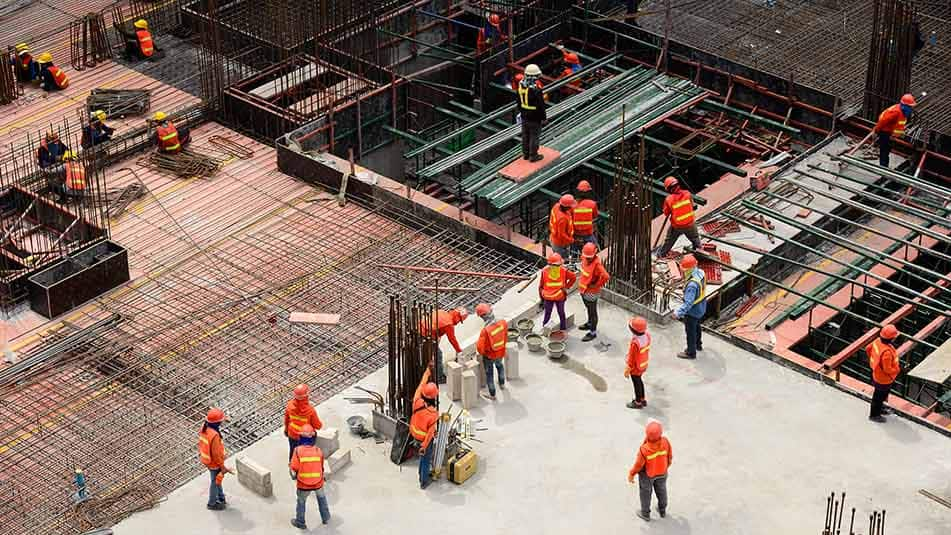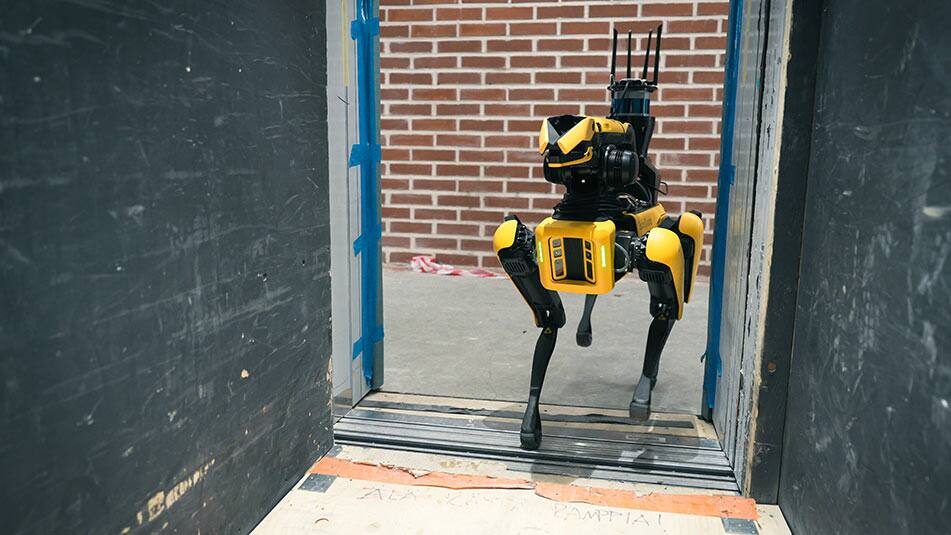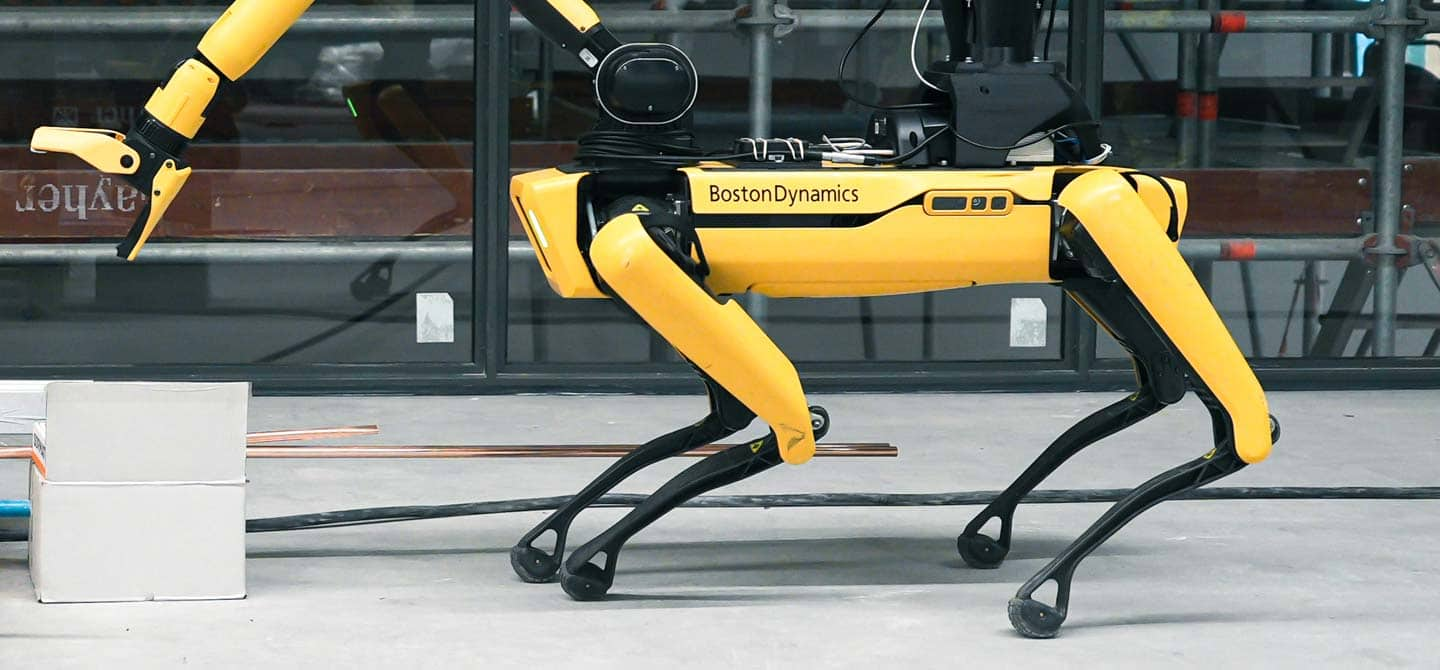Are you interested in KONE as a corporate business or a career opportunity?
Corporate siteThere are many sights that are common to construction sites, including packaging material, dust and building supplies. One not-so-usual addition is a robotic dog that ducks in and out of elevators and maneuvers deftly between people and equipment. But a team of top innovators from across the construction industry believe that Spot the robot dog may hold answers to making building smoother, faster and less resource-intensive.
Meet Spot – a high-tech, four-legged friend who is being trained to recognize what happens on large construction sites so that it can give real-time project updates. Its sensors automatically gather data to identify when a task is completed, and it can flag up and help avoid safety risks and much more.
On an almost-completed building on the campus of Aalto University in the Finnish capital, Spot the robot dog is learning how to move around the construction site independently and safely – so that it can gather construction data using AI and machine learning.
After decades of scant productivity growth in the sector, automation, robotics and digitization are starting to play an increasing role in construction. Carrying out site checks and keeping up with progress can be time-consuming for project managers and lead to bottlenecks, so Spot is intended to free up valuable time and resources, as well as allow for more efficient planning and reduction of waste.
And while Spot, which weighs in at just 25kg (55 pounds), plays just a small part in solving the productivity problem in the construction sector, the findings of this robotic canine feed into a much larger story about the future of our cities.
It's a story that KONE is helping to write.

Cleaner, faster building through automation
Spot is part of a program entitled ACTOR (Automatic Coordination of Construction Actors), which brings together innovation-focused companies like KONE and research bodies such as Finland’s Aalto University, to address the productivity problem in construction.
'Problem' isn't too big a word for it: research has shown that construction workers spend on average only a quarter of their time on value-adding activities on the site, with the rest spent dealing with hold-ups such as delayed materials and other blockages.
Poor productivity and inefficiencies also do little to ease the construction sector’s vast environmental impact, with the industry accounting for approximately 38% of global carbon emissions. The ACTOR project is looking to find ways to not only make construction faster and smoother (thereby reducing energy consumption), but also to cut waste: studies have estimated that a whole 30% of products delivered to a construction site end up in landfill.
KONE is involved in the ACTOR project as part of its The Flow of Urban Life ecosystem program, co-funded by Business Finland as part of their “Veturi” initiative. Together with customers and partners, KONE aims to solve some of the major challenges caused by urbanization and climate change through developing smooth and sustainable services and solutions across the built environment.

The benefits of utilizing construction data
When it kicked off in January 2022, the two-year, €3.8m Actor project quickly came to the realization that harnessing construction data could be key in finding ways to boost efficiency.
Many building projects currently underuse the data available to them, missing out on potentially valuable insights that could help reduce carbon emissions, improve safety or boost operational productivity.
"All of the information is typically somewhere in somebody's head or in written notes," says Aarni Heiskanen of AE Partners, a coordinator for the ACTOR program.
With dozens or even hundreds of companies often involved in a large building's creation, “how can you know at any moment what's going on on the site? That's one of the things that Aalto have been studying – this so-called 'situational awareness'."
Situational awareness, Heiskanen explains, is about everybody on site knowing what they have to do, what others have done and what's coming next. Which all comes back to data collection and sharing – underpinned by robotics and automation, to make gathering and analyzing the vital data as pain-free and instantaneous as possible.
The ACTOR program aims to work towards every participant, from architect to construction worker, having the information they need at their fingertips. The program is supported by Business Finland’s Low Carbon Built Environment Program, which receives funding from the EU’s Recovery and Resilience Facility.

Construction robots even take the elevator
Collecting the data is one thing, but sharing it is another, says Janne Öfversten, senior technology manager at KONE: "We need to find ways to standardize everything so that it is easy to integrate between different systems."
This includes making sure that Spot the robot dog can also communicate with the on-site elevators, which is where KONE comes in.
“KONE is helping make sure that Spot causes as little disruption to the flow of the construction site as possible by providing insight into which elevators to use and when," says Öfversten.
While Spot is mainly used “for scanning and taking video to analyze progress on site”, it can perform certain tasks, too, such as installing sensors and carrying small things like spare parts or tools, Öfversten explains.
In designing the robot’s role on site, the project participants have been careful to take into account data protection and privacy obligations. The data Spot collects is strictly anonymized and relates only to building site operations, not people.
"What we are doing is clearly communicated to the workers,” Öfversten says, “and we explain why it will actually help them work better, more safely and more smoothly."
Automation is a team game
One of the ACTOR project’s strengths is that it calls on the best minds from different, relevant fields. Aalto is a leading light in automated data collection and standardized data representation; KONE is a global expert in people flow; Carinafour is a supply-chain specialist whose systems help improve material management.
Carinafour's President, Ari Viitanen, can see multiple ways in which better collaboration between different stakeholders in the construction sector could enhance efficiencies and lead to greater environmental sustainability.
As part of ACTOR, his company is developing solutions which use KONE's diagnostics technology to understand which floors of a building site materials have arrived at and when – and there are plans to take the idea further.
"Within ten years, those construction companies which aren’t developing and embracing the potential of digitization won’t exist anymore," says Viitanen. "Construction sites by then will be totally different."
KONE envisions a similarly shifting landscape – and is eager to lead the way. As Öfversten says: "We are building an ecosystem where we can develop our products and services for the future. As well as creating this network, we are also learning from others about how these solutions could complement what they will be doing as well."

